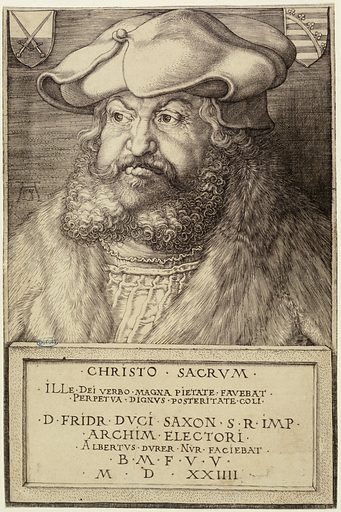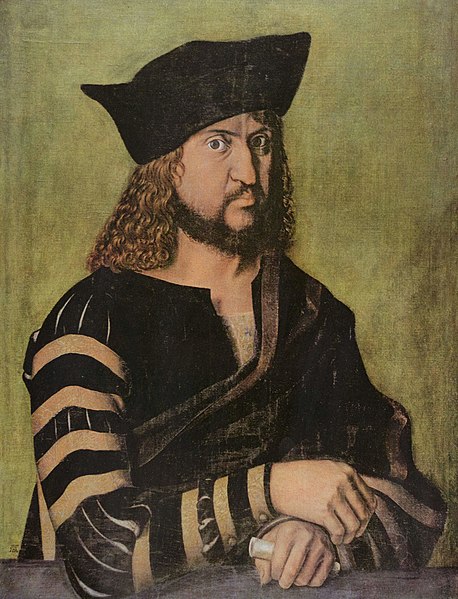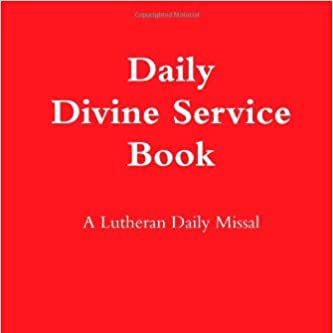A Protector of Lutherans

The Lutheran Church, on May 5th, celebrates the life and work of St. Frederick the Wise, a staunch supporter of St. Martin Luther. Best known for providing Luther with protection during his excommunication, this prince-elector became an essential figure to the Reformation story and is still highly regarded today for the mercy he bestowed on many early Lutherans.
St. Frederick the Wise, also known as Frederick the III of Saxony, was born in Torgau in 1463. Hailing from a political family, Frederick was certainly raised from a young age with the knowledge that he would have to rule over one of the several major territories in the German land. In fact, his family was the number one competitor to the famous Habsburgs. His benevolent reputation was established early on: even from the first years of his reign over Saxony, which started well before the Reformation, Frederick was considered an especially peaceful sovereign who sought to keep his territory and people out of war.
His life’s overlap with Martin Luther began in 1502, when he founded the University of Wittenberg, where Luther was hired on to be a professor. In fact, Luther was a faculty member at Wittenberg when he nailed his famous theses in 1517. Due to Luther’s strong connections there, Wittenberg would become the main center of Reformation activity throughout the next many decades—St. Frederick the Wise allowed it to be such.
Especially during the early Reformation, such as after Luther’s 1521 Diet of Worms exile by the Pope, Frederick protected Luther by taking him into custody at the Wartburg castle. During his time here, Frederick utilized his political expertise and diplomatic stalling tactics to delay Luther’s punishment. This, of course, gave Luther time for his frenzied translation of the Bible into German and his collaboration with other friends that would prove to be essential to the spreading of the Reformation wide and far.
However, this decision to grant Luther protection was not necessarily based on close kinship between the men. Although Frederick was the founder of the University of Wittenberg, there is not much evidence that the two men had lots of contact with each other 1:1. Some of this can once again be traced back to Frederick’s political prowess and his awareness of the power of deniability. Even the well-known kidnapping of Luther and him being taken to Wartburg is said to have been arranged by Frederick’s advisors and was not orchestrated by Frederick himself.
Thus, Frederick’s conviction to defend Luther is thought to more so be based on a combination of the saint’s disposition towards peace, his shrewd political moves in a maddening game against the Pope, and ultimately his belief that Luther was being unjustly persecuted by the Church—something he would not let stand in his land.
Frederick died just a few years after the famous Wartburg exchange, on May 5, 1525 in Lochau. While he died a Catholic, there are substantial reasons to believe he was persuaded bit by bit by the doctrines of the Reformation and died more in favor of it than against it.
A Brief History
This question of whether St. Frederick was a Lutheran or not certainly still casts a long shadow over the prince elector’s life today. Was he a staunch defender of Luther because he himself was a believer in the key tenets of the Reformation? Or was he merely moved because of his dislike of the Pope’s decisions in regards to Martin Luther?
Part of the reason we can’t say for sure is that St. Frederick recorded almost none of his thoughts in response to the events of the 16th century, in comparison with many of the other major actors of the Reformation story.

However, this doesn’t mean that St. Frederick hasn’t long stood out as an important saint for Lutherans. Instead a great respect for St. Frederick has always been among those within the Lutheran Church and they have long looked to him as being a key player in the Reformation story. Further, it seems as though Frederick did listen to some of Luther’s key teachings and was convinced of their Biblical support—for example, he gave up the buying of indulgences and relics (a previous source of bragging rights for him. It is also said that on his deathbed he also received the sacrament in both kinds.
No matter his personal beliefs however, his protection of Luther and his convictions regarding religious freedom would forever impact the story of the Reformation. Ever since then, his day has been remembered by the Church and those who admire his calculated movements during the most pivotal years of early Lutheranism.
Collect
O Almighty God, who hast knit together Thine elect in one communion and fellowship in the mystical body of Thy Son Jesus Christ, our Lord: grant us grace so to follow Thy blessed saints in all virtuous and godly living, that we may come to the unspeakable joys which Thou hast prepared for those who unfeignedly love Thee; through the same, Jesus Christ, Thy Son, our Lord, who liveth and reigneth with Thee and the Holy Ghost: ever one God, world without end. Amen.
Lessons

Resources
Issues, Etc. interview with Dr. Sam Wellman on Frederick the Wise
Propers found in Daily Divine Service Book: A Lutheran Daily Missal, edited by the Rev. Heath Curtis
References:
1. Sam Wellman. Frederick the Wise: Seen and Unseen Lives of Martin Luther’s Protector. Concordia Publishing House. 2015.
2. Frederick the Wise. Lutheran Reformation.
Images:
1. Frederick III of Saxony, Albrecht Durer, Germany, 1524.
2. Portrait of Frederick III of Saxony, Albrecht Durer, Germany, 1496.
3. Elector Friedrich the Wise of Saxony, Lucas Cranach the Elder, Germany, after 1532.




Leave a Reply